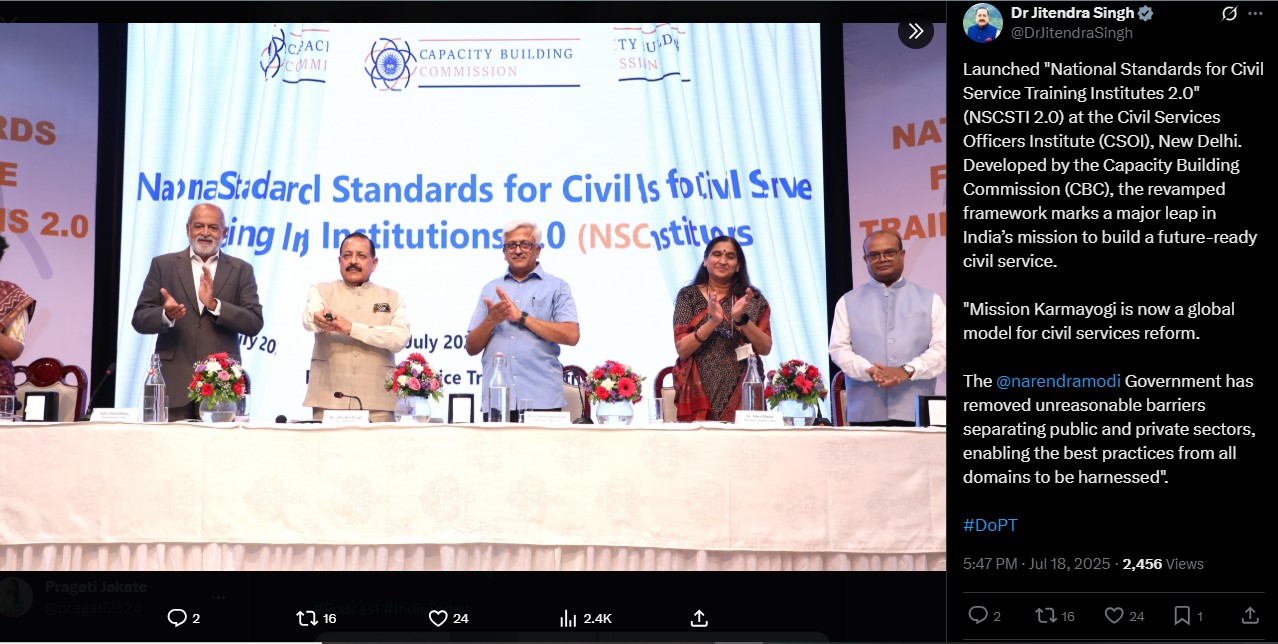Union Minister Dr. Jitendra Singh launched the National Standards for Civil Service Training Institutes 2.0 (NSCSTI 2.0) at the Civil Services Officers Institute (CSOI), New Delhi. Its marking a major reform in India’s civil service training ecosystem.
Developed by the Capacity Building Commission (CBC), the revamped framework aims to build a future-ready, citizen-centric, and performance-driven civil service. The event saw participation from senior government officials, CBC members, and faculty from training institutes across India.

Image Credit: Dr. Jitendra Singh / Twitter
🔹 What is NSCSTI 2.0?
NSCSTI 2.0 is a revamped framework to evaluate and upgrade Civil Services Training Institutes (CSTIs) at all levels—Central, State, and Urban Local Bodies. It simplifies and streamlines earlier processes by reducing evaluation metrics from 59 to 43, ensuring a sharper focus on outcomes and institutional excellence.
“NSCSTI 2.0 is not just a compliance tool—it is a transformative step toward building high-performing training institutions,” said Dr. Jitendra Singh.
Key Features of the Framework
-
Digitally aligned: Embraces hybrid learning and AI-driven models
-
Includes Indian Knowledge Systems (IKS), Karmayogi Competency Model (KCM), and Amrit Gyaan Kosh (AGK)
-
Grounded in field-level consultations with over 160 CSTIs and experts
-
Encourages institutes to introspect, innovate, and pursue excellence
Dr. Singh drew parallels with the Aspirational Districts Programme, stating that just as it empowered backward districts, NSCSTI 2.0 enables CSTIs to rise beyond their limits. The framework supports both cooperation and healthy competition among training institutes.
“Prime Minister Narendra Modi has always encouraged out-of-the-box thinking and empowered us to break past taboos,” Dr. Singh said.
“The Government has also removed barriers between public and private sectors, enabling the best practices from all domains to be integrated.”
He also emphasized the importance of administrative training in scientific and technical institutions, stressing that technical expertise must be matched with governance skills.
Dr. Singh revealed that countries such as Bangladesh, South Africa, and Maldives have shown interest in learning from India’s Mission Karmayogi, now seen as a global model for civil service reform.
Key Achievements
-
Over 195 CSTIs accredited in just two years under the original framework
-
NSCSTI 2.0 is based on real-time feedback and promotes participatory governance
-
Fully operational accreditation portal reactivated for a transparent process
-
Encourages cross-learning and sharing of success stories between institutes
Who Attended the Event?
Notable attendees included:
-
Adil Zainulbhai, Chairperson, Capacity Building Commission
-
Dr. R. Balasubramaniam, Member (HR), CBC
-
Dr. Alka Mittal, Member (Admn), CBC
-
V. Lalithalakshmi, CEO, Karmayogi Bharat
-
Syama Prasad Roy, Joint Secretary, CBC
-
Faculty from Administrative and Central Training Institutes
The launch of NSCSTI 2.0 marks a significant step toward building an efficient, inclusive, and modern governance system. With a focus on performance, innovation, and digital transformation, this framework brings India closer to the vision of “Viksit Bharat” and citizen-first governance.









